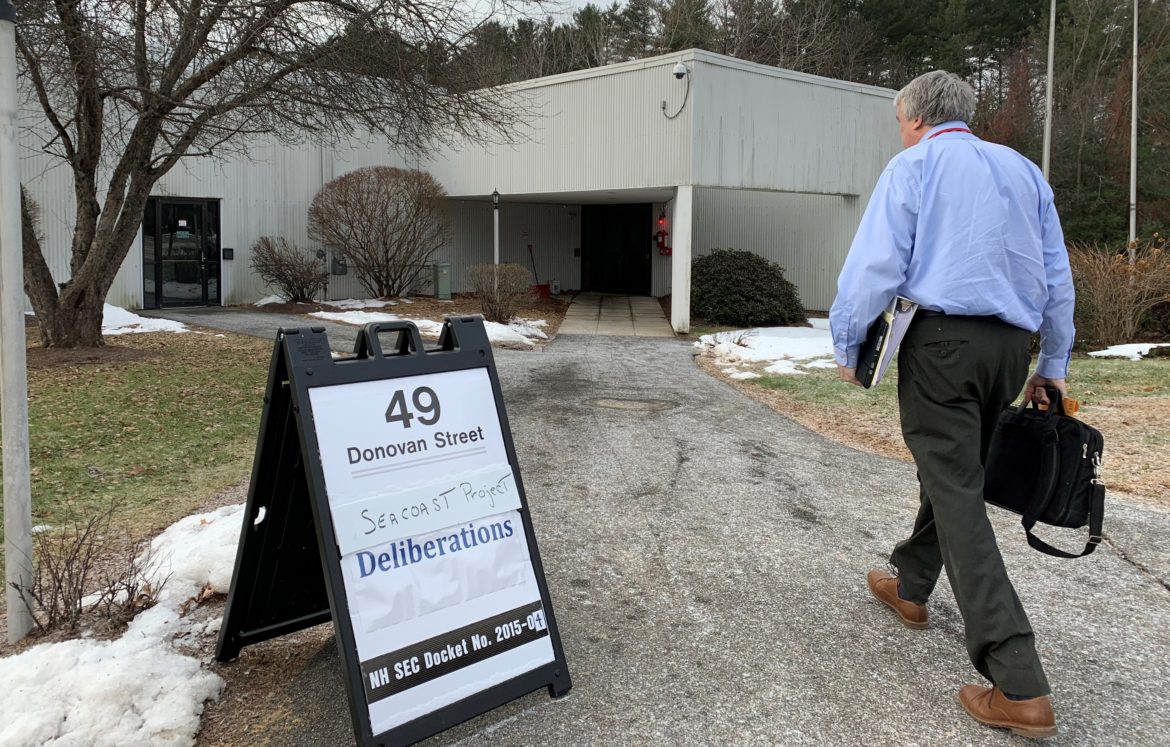By NANCY WEST, InDepthNH.org
CONCORD – The Conservation Law Foundation, town of Durham and a group of Durham residents have asked state regulators to reconsider their decision to grant Eversource a certificate to build an unpopular 13-mile transmission line from Madbury to Portsmouth.
Called the Seacoast Reliability Project, the $84 million powerline was unanimously approved by the Site Evaluation Committee on Dec. 10, 2018.
It is a reliability project, which means it has been deemed necessary to provide the Seacoast’s growing demand for electricity.
Town Administrator Todd Selig said Durham is seeking reconsideration because Eversource failed to obtain Governor and Executive Council approval to put the cable and 8,600 square feet of concrete mattresses in tidal waters crossing Little Bay.
“Durham believes the SEC should reopen the case and revisit its approval of the project,” Selig said in an email.
Anyone seeking a wetlands permit involving publicly owned water bodies must also obtain the permission of the Governor and Council, which Eversource also failed to do, Durham’s motion states.
Durham also argues the SEC’s determination that Eversource’s failure to provide any information about concrete mattresses to the Public Utilities Commission to obtain a license to install cable in Little Bay is unlawful and unreasonable, Selig said.
The Town Council believes the SEC unreasonably concluded that the project will not have an unreasonable adverse effect on the environment, Selig said.
Eversource statement
Spokesman Kaitlyn Woods said Eversource was disappointed by the requests to rehear the matter.
Woods said the requests could “cause costly delays to a project that is critical to supporting continued economic growth in the Seacoast region – one of the fastest growing areas in New England.”
The SEC “approved this project following a deliberate and thorough review process, taking into consideration our extensive and ongoing efforts to work closely with the host communities and address the concerns of all stakeholders,” Woods said.
According to the Conservation Law Foundation filing, the SEC didn’t properly address nitrogen pollution and impacts on eelgrass, among other claims.
“The (SEC) decision fails to properly address the project’s impacts on oysters and public health,” according to CLF’s motion.
CLF also said the decision fails to address the project’s impacts on the Great Bay estuary as part of its “orderly development of the region” analysis.
Raising additional issues, the Durham residents group motion said the SEC impermissibly delegated its statutory obligation to determine the public interest as to private property as part of the dispute resolution process.
SEC approval
In its unanimous approval of the project, the SEC found that Eversource has adequate financial, technical, and managerial capability to build and run the project.
The committee also agreed that the project will not unduly interfere with the orderly development of the region, will not have an unreasonable adverse effect on aesthetics, historic sites, air and water quality, the natural environment, and public health and safety and lastly determined that the project is in the public’s interest.





